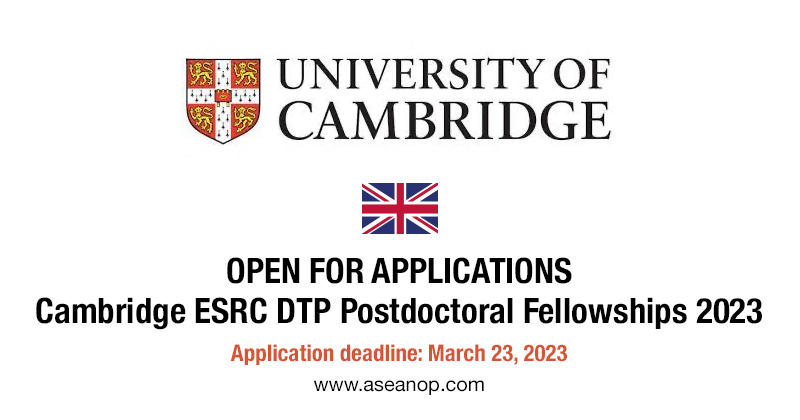OPEN FOR APPLICATIONS: Cambridge ESRC DTP Postdoctoral Fellowships 2023

Cambridge ESRC DTP will be launching the latest call for applications for Postdoctoral Fellowships at the start of November.
Up to seven fellowships are available for October 2023.
For information about the application process and the online form please click on the link below
The national ESRC deadline for applications for review by DTPs is 16:00 on 23 March 2023.
Departments may have internal deadlines earlier than this date. You should contact your chosen department directly to check whether this is the case.
Key dates
| 1 November 2022 | Online application portal opens |
| 23 March 2023 at 16.00 | Closing date for applications |
| 26 June 2023 | Decisions confirmed to applicants |
| By end of July 2023 | Successful proposals submitted in Je-S |
| 1 October 2023 | Fellowships commence |
About the Postdoctoral Fellowship scheme
Each year the Cambridge ESRC DTP invites applications for up to seven Postdoctoral Fellowships, to be based within the Cambridge ESRC DTP’s participating departments.
The Fellowship is intended to provide support to those who are within 12 months of completing their PhD, to support them in consolidating their PhD, and preparing them for the next stage of their research careers. For the majority this is likely to be a research career in academia; however, those with a clearly articulated programme of activities to support their transition to a research career outside of academia (eg a researcher in public, private, or civil society organisations) will also be considered.
The grants provide funding for up to one year full-time, or up to two years part-time to give fellows time to prepare for a successful career in research either within or beyond academia.
Applications can be supported on a part-time basis, but Fellows must devote 100% of their contracted time to the Fellowship. This can include contributions to teaching, subject to restrictions specified by ESRC.
Fellowships are bound by the same conditions as ESRC standard grants: https://esrc.ukri.org/funding/guidance-for-applicants/research-funding-guide/.
Eligibility
- Applicants must have completed their PhD at a research organisation that is part of a Doctoral Training Partnership (DTP) but they do not need to have held an ESRC-funded doctoral studentship in order to apply.
- Fellowships must be based within one of the 28 participating Departments of the Cambridge ESRC DTP.
- Fellowships are open to all applicants (Home and international);
- There are no residential restrictions beyond the grant holder being resident in the UK for the period of the fellowship award.
- Applicants must:
- Have been awarded a PhD or have passed their viva voce with minor amendments by the application deadline of 23 March 2023 and have been awarded their PhD by the fellowship start date of 1 October 2023;
- Have no more than 12 months of active postdoctoral experience since passing their viva voce (allowing for career breaks) by 23 March 2023.
Mentors
- All Fellows are required to have a mentor based within their respective research department at the research organisation;
- The mentor should have experience and a strong interest in the applicant’s field of research but should not normally be the applicant’s PhD supervisor (only in exceptional circumstances and with full justification in the application);
- To familiarise themselves with the interests of academic staff within the Cambridge ESRC DTP’s participating departments, applicants are advised to visit the staff pages of relevant Departmental websites;
- A mentor should have the skills and experience relevant to the aims of the fellowship and the expertise to assist the fellow in achieving the goals and activities of their fellowship. Consequently, we envisage that mentors would normally be a Professor or Assistant Professor, ideally with 3 years’ experience as a PI or PhD supervisor, or have experience of supporting postdocs;
- A secondary mentor is permitted, particularly in interdisciplinary areas or where the fellow will be spending time at an overseas institution. The secondary mentor could be the PhD supervisor or if they are moving institutions, an individual from the institution where the fellow completed their PhD.
More information / Source: Official Website HERE.

Diplôme de Baccalauréat
Diplôme de licence en cours
Hi I am interesting